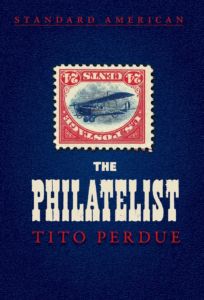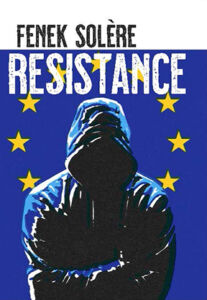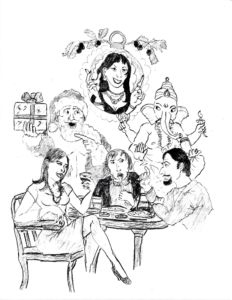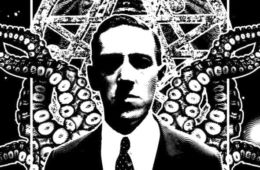A Christmas Curry, Part 1
Part 1 of 2
It was morning in America and Christmas Eve in Boston, but Reagan’s good cheer at once again making America the greatest show on Earth had little effect on me, because I was stuck doing a double shift.
I was a security guard, and “doubles,” as we grudgingly called them, were a staple of the trade. In addition to being a guard, I was also a writer, artiste, and bon vivant, but survived on the paltry paycheck coming from door number one. I’d been in Boston for four years and was poor, but happy. The East Coast’s energy perked me up, and jazzed much of my thought and writing in a way the Midwest never had. I had made the right choice in going here. Boston’s tempo and synthesis of Yankee tradition and bustling port city taking all comers still pleased me, but, damn it, it was Christmas Eve and I was poor. All I had was 23 dollars to last until the banks opened on the day after Christmas.
This fact bit harder as people streamed past me, their heels and shoes clicking on the marble lobby’s floor as they sported their bright and woolly holiday coats, toting packages or gourmet coffee cups on their way to the usual corporate routine of office parties, bars, and home.
The holiday spirit filled my olfactory senses. Tire-sized wreaths wafted the scent of evergreens and the haunting cinnamon-and-spice scent of gourmet Christmas cookies still hovered like a ghost, all being consumed in a Christmas party for the banking crew below. A peppermint display near the swishing revolving door tickled my nose.
My fingers stroked my flat wallet. Only 23 bucks.
The double shift had ruined my Christmas shopping schedule, such as it was. At least I’d posted my Christmas cards. I especially enjoyed a joke card I had sent to Mother, a caricature of Bob Hope in formal tie and tails, sleigh bells tied to his tailcoat, the caption reading “Bells on Bob’s Tail Ring.” It got a laugh as I looked it over at the bookshop off of Cambridge Street that was across from the Beacon Hill rooming house where I was squatting with an assorted collection of losers.
Mother’s laughter showed that, on occasion, my opaque sense of humor connected with her. Usually, my joke and wit got stares in the Midwest, or the usual “Huh?” Boston, however, laughed at my jokes. It was almost worth missing a square meal or full paycheck to experience it.
The much-needed double also meant that I had to pass up dinner with Chandra, a friend. That really bit hard, because I liked her. Even though things were cooling, missing time with her sucked.
The rush of exiting people had dropped off to a trickle, and apart from a grunting UPS guy who was delivering an armful of last-minute packages, no one was coming in. The lights outside — glittering Boston holiday light — drew everyone like Christmas moths to a flame.
“Merry Christmas, my friend.”
I turned to find Gino, the maintenance man, strolling up, his keyring jingling like a sleigh. His thick mustache and black thatch of hair made him resemble a Jim Croce who did wiring and plumbing. He nodded at the last batch of office girls who were swishing through the door, which spun like a revolver in a Western shoot out. They joked and played with it. You could catch their boozy breath, since they’d obviously had doubles on the eggnog. Then the lobby was dead. Outride, lit cigarettes from the girls offered discs of light that added to the festive displays on the streets.
“Merry Christmas back to you.” I smiled. “Looks like it’s you and me, huh? The floors are empty?”
“Dead and gone,” he replied. “Like you.”
“Huh?”
“Just got the order. Sending you home. Management don’t need security for the next two days. Just maintenance.”
“Yeah, but what about my double?”
“Christmas Eve and day shuffling here in the lobby?”
He shook his head. “Go on.”
“I need the dough.”
“Tough, but the suits had a powwow and decided to save some nickels, so they looked at security. I gotta hang out until Goochie shows up, and he’d better haul his ass in here. If I’m late for midnight mass, I’ll be on the old lady’s shit list.”
There it was. I thought to call my supervisor, but Gino read my mind. “We notified your boss, and the flunky at the desk said no big deal.”
A car pulled up in front of the entrance, its flashing red lights adding to the festiveness. Darkness had hit like a bat whacking a ball. At six, it felt like midnight. I saw that it was my company’s patrol car, and out popped Jak, the supervisor. He waved to Gino, which meant that all was okay.
Gino thumbed toward the door. “Go on, beat it. Go guard a beer or a broad.”
I shoved my notebook and a book into my carrying bag, quickly pulling a black turtleneck over my faux police shirt and picking up my black coat. It was an Army surplus coat I’d picked up at Billy Vigor’s Army-Navy store on Summer Street, and I called it my pervert coat, since it reminded me of the coats you saw guys wear when they went to the porno movie hour in the Combat Zone.
I jingled the quarter and two dimes in my other pocket as Jak swished in. Jakit Pandy was an engineer doing work at Raytheon as well as gigs at the research labs past I-95 at Natick. He also did security work as a part-time gig. Jak’s eyes were clever and probing, with a no-BS manner when listening to the alibis from guards who showed up late or out of uniform, or who invoked other elements of the usual minimum-wage litany. In a beard and turban he’ would have looked like a master Rajah or pundit, but Jak’s brown cheeks were clean-shaven, his coat and tie indicating corporate security, a clipboard in his right hand. He offered me some stapled sheets. “Here. Add these to your post orders. Not now. When you come back.”
I buttoned up my overcoat. “So I got to go?”
“Yes,” Jak replied. “Gino, it is you and the silence, no?”
“And the roaches. So, Merry Christmas.”
“And to you, my friend.”
I shouldered my bag, and then it hit me: “You’re going to Cambridge, right?”
“Yes. A couple of posts there and Somerville, then I call it a night.”
“How about a lift?”

You can buy Tito Perdue’s The Philatelist here.
“Come on.” He pointed at the car. I shrugged and followed. As soon as we had gone through the revolving door, I heard the click as Gino locked it up. The streets were already empty, leaving canyons of brick and glass.
Once we were in the car, Jak made a u-turn and, in the zig-zag maze that are downtown Boston’s streets, headed west toward Beacon Street and the golden dome of the state house. “I tried to find a shift for you, but it’s all filled up. So, enjoy your holiday.”
“Yeah, ho-ho-ho.”
Jak nodded as he drove on. We passed the huge creche on Boston Common. There had been a problem with creches. The American Civil Liberties Union had started griping that they had no place on public or civic property. In Cambridge, a pack of gay activists who shouted that creches weren’t multicultural but were rather homophobic and a relic of colonialism, Reagan, or whatever trashed and stomped the city’s creche. The Mayor was gay and had ordered the cops to look the other way. It was a Christmas warning of what antifa would be like in the future. In Boston, however, our creche was alive and well, and featured a wide, lighted display. Despite my misgivings about Christianity, It was soothing to look at; you could see your shadow in the glow of its huge lights.
Jak turned right and we crossed the Harvard Bridge over the Charles, arriving at the frontiers of MIT. We were on Massachusetts Avenue, which fed into Harvard Square, but Jak stopped at Central Square. It featured a collection of secondhand stores, cheapie resale shops, and appliance stores that were on their last legs. The usual stream of students one saw there was now gone. It also hosted a necklace of Indian restaurants and curry joints that orbited the Central Square’s T stop. Storefront lights glowed against the blackened windows. I pointed at an Indian restaurant; it was the last place open, as it was past six, and all Boston’s restaurants had pulled a Cinderella.
Jak pulled up in front. The silhouette of a boy stood in front of the place, holding a paper sack. He looked like a drug mule waiting for the pickup, but as he approached Jak’s side of the car it turned out he was Indian. Indians are never mules.
“These people take care of me,” Jak explained. “Try the chicken curry. It’s a house specialty.”
“Sure,” I said, opening the door. “Hoping to meet someone here.”
“Someone who will pick up the check, no?’
“You know these guys. They take care of you. Any chance you can talk them into giving me a freebie?”
Jak caught my smile and cracked his own back as he waved his hand. “Go on,” he said. “Go. I have work to do.” He took the sack from the kid, who hurried back in.
“Merry Christmas,” Jak called.
“Merry Christmas,” I echoed.
It was chilly and empty on the streets. On one abandoned storefront was plastered a row of posters from the Socialist Worker’s Party for some black woman who was running for President. Apparently, if elected she would overturn the colonial-imperialist-racist madness of Reagan. Every six months the faces changed, but the slogans remained the same — and it had all the reality of Santa’s visit.
A brief breeze slapped my cheeks as I entered the restaurant.
* * *
A blast of warm, spice-scented air kissed me as I walked in. Waiters hustled from table to table to the twanging of sitars on the loudspeaker, accompanied by high-pitched Indian singers. No “Jingle Bells” at all — and it was a semi-relief. A Santa happily greeted customers from a table, but next to him was Ganesha, the Indian elephant-headed god of beginnings, industry, and festivals.
I savored the bright colors, lights, and festoons of flowers, even though they were artificial. Indian colors were never muted; they hit you like the hot spices and curries awaiting me in their food. I scanned for Chandra, hoping I hadn’t missed her. Families and students filled most of the tables while waiters bustled past me.
“Steve!”
I turned to catch Chandra’s wave. She wore a brilliant frock of sparkle and emerald, the sleeves scalloped, as was the fashion. Her style offered a tempting whiff of décolletage — not that she was that well-endowed, but anything below her neck and above her midriff showed promise that it would be a buyer’s market should she offer her goods.
I squeezed past buzzing, chattering tables to hers. Chandra and I had worked together the previous year in doing phone surveys and polling at an info lab a block down by the brownstone bell-towered city hall. Her skin was a tallow shade, and she had light, almost amber hair. Her mother was Indian, her father a bookish Yankee from Amherst. Two years before I had been on the streets protesting Reagan’s war in Central America, and Chandra had carried a placard beside me. A post-demo chat led to coffee, a movie at the Harvard Square Theater, and so on and so forth. She had graduated in Political Science and had slogged away at the polling place to pay for a vacation in Rio; I had done it to stay alive while finishing my first novel . Six months later, she got to implant prints of her breasts on Copacabana Beach while I had my baby.
Seated across from her was a brown-skinned man in a silk suit and an ivory banded shirt. His heavy eyelids and direct gaze made him look like someone’s Arabian knight.
“What are you doing here?” she asked. “You gave me some boo-hoo about guarding some rich asshole’s lobby in Boston.”
“I was costing the asshole too much bread. He let me go.”
“Ah,” her friend interjected, seeming pleased. “The rich assholes dislike you. You are making the right enemies.” His accent was Middle Eastern, with impeccable pronunciation and a twist of snarkiness.
“This — ” Chandra’s smile and hands did a “ta-dah!” “– is Fetoosh. He’s an asshole, but a good one.”
Fetoosh cradled a glass of wine, nodding as Chandra made room for me to sit. I pulled off my pervert coat.
“Your coat,” he asked, gesturing. “Are you a pervert?”
Chandra slapped his wrist. “Fetoosh!” But then she turned to me, eyes mischievous. “Well, answer the man.”
“I wear a pervert coat, but I’m not. Dissatisfied?”
Fetoosh swallowed his wine. “I assume you are a pervert or artistic intellectual. I have no objection to perverts. On occasion, they can be energetic conversationalists.”
“How about intellectuals?”
“You could be a rival.”
I stroked Chandra’s arm. “Yes. I could be.”
“Fight over me later.” Chandra touched both of our shoulders. “Meanwhile, let’s have a holly jolly Christmas and all that Santa Claus poop.” She offered me a plate of warm flatbread. “Naan? Dip it in the tomato bhuna. You must be famished.”
I took the naan and made a deep dip. It hit the spot, then I collared a waiter to expedite an order of Murg Kari. The curry chicken would be welcome, as was the bottle of Kingfisher I ordered. I helped myself to their bright green mint chutney, and ordered a plate of samosas. It felt good to pile the Subcontinent down my throat. The curry would be an excellent embellishment to Christmas Eve. I liked eclectic holidays, and Boston more than accommodated me. I had had my first Thanksgiving dinner there in a Pakistani restaurant three doors down, and my palate was already ready for a mango milkshake. It made pumpkin pie taste like how a spinster librarian looks.
“Santa Claus poop,” pondered Fetoosh. “Actually, Santa Claus is a very good god: happiness, gifts, joviality, gluttony. You should make him one of your gods.”
“We’ve only got one,” I said. “Unless you go in for the Trinity.”
“Trinity,” shrugged a smirking Fetoosh. “Father, son, holy ghost. How is that possible? God cannot be three. God is God.”
Chandra smiled as he poured her more wine from the carafe. I was relieved that the beer then arrived. “So,” I asked, “are you Muslim?”
“I am a bit of here and there.”
Chandra giggled. “Wouldn’t he be great on The Dating Game?”
“Oh, he’d be a catch. Where are you from?”
Fetoosh’s lips curled into a puckered smile. “From somewhere your country is not fond of.”
I sensed that he was probably Iranian, because so many of them had come there to study, courtesy of the Shah. In Iran they were nicknamed the Massachuseti because so many of them studied at MIT. They were considered arrogant and generally acidic toward the Shah, and most assuredly so toward Reagan. They were also generally loaded, hence Chandra’s interest.
It turned out that, in spite of being broke, I was enjoying my liberation from the lobby and my Christmas watch. It was allowing the other me — the writer and wit — to come out. My money or lack of it didn’t mean shit now. “That’s a great pick-up line,” I quipped while looking at Chandra. “Did it work for you?”

You can buy Fenek Solère’s Resistance here.
She fingered her necklace and licked her lips. “Fetoosh has his purposes.”
“God, Chandra,” I thought, “you are a tease. A goddamned tease, and last Christmas, between the sheets . . . but if God is God, then is then.” The chicken curry arrived and I dug into it. Chandra and Fetoosh ate from their own plates, a mix of lamb, beef, and palak paneer, the last item’s rich, green coloring fitting in nicely with the holiday colors. It was like eating evergreen. We talked of grants, vacations, and a new possible fellowship at the Harvard Kennedy School. I held my own, always getting a rise from Chandra (and of course she knew it). But I sensed — had sensed for months, if not longer — that we were at the “two ships passing” stage. She enjoyed my being a writer and my devotion to her. Yet, she was moving on. To what I didn’t know, but she was becoming a memory, like one of the Christmas lights . It’s the season of light, the female voice whispered on WGBH, recalling so much. Chandra’s probing and mischievous face, once blazing, now glowed like a candle, a star . . .
The Christmas curry was damned good, The people, the warmth, and the bustle were such a contrast to the dark world outside on Mass. Ave.
Fetoosh nuzzled Chandra, who fingered her necklace again — an arousal sign — and she shifted in her seat. “Okay, but Diwali is so full of lights. It’s almost Christmas. Don’t you think so, Steve?”
“Autumn festival,” I said. “Somewhat.”
Fetoosh frowned. “What of the Jews. Their Hanukkah? Always lights, they say; lights.”
“Not exactly a winter festival, more a national struggle. The lights denote a siege. They kind of wandered in to all the light festivals and tacked it on. Sort of a ‘me, too’ to the light festivals.”
Fetoosh laughed. “Yes, to . . .latch on to others. A synthetic holiday, then.”
Chandra raised an eyebrow. “They’re pretty serious about it.”
“Ah.” Fetoosh gestured. “And this Christmas is synthetic, would you say? It is a grafting, no? The Christmas festival steals — if I may say that — the Roman Saturnalia. The Santa Claus, eh? This birth of a King is . . .” He swept his hand through the air widely. “. . . a message.”
Since I was the only one with pale skin at the table, I felt Fetoosh’s direct gaze. I swallowed. “Of Christ coming to save man from sin. His birth will end death. For those who accept.”
“No gift?” Fetoosh flexed his rhetorical claws. “Not freely given like Santa? There must be a fee?”
“The fee is for your own good,” I said.
Chandra smiled and raised her glass. “You pays your money and you takes your choice.”
Fetoosh nodded, ready to continue some kind of attack, bolstered by wine, audacity, and the happy noises of the place. “It recalls the Talmud. You know. The Jews have all these rules about sinning and making redemption, to atone. Yet, yet . . .” He waved his index finger. “They have so many ways to avoid the penalty of sinning, by bargaining with their god. Always bargaining.”
“Jews, huh?” I asked.
Fetoosh offered a wine-fortified nod. I wondered if he was letting his anti-Semitism slip out, or had simply had too much to drink, or — like so many of us in Boston — just liked to yak.
It was Chandra’s turn to shake her finger. “Come on, don’t be nasty. It’s Christmas.”
“Who is being ‘nasty?’ I am only . . . speculating. Steve, do you speculate? In your writing, which I am told is very good.”
Chandra winked at me. Fetoosh continued: “Do you write of ideas and arguments, hm? Are you of the world? Or do you write funny stories? Americans are so fond of funny stories. They ignore the misery they bring, the dedication to colonialism . . . to be funny?”
It was an accusation, however tipsy it came out. I shrugged. “Who doesn’t like a good laugh?”
Fetoosh flashed his beautiful white teeth, which clearly had been kept free of American sugar. “I laugh very much. So much good in life.”
“He does,” Chandra said. “And it’s a battle making sure it’s not at my expense.”
“Did you tell him you’re high maintenance?”
“He’s finding out.”
Fetoosh gave a hearty Santa laugh, then rested his chin on his palm. “You are a difficult woman, yes, but so wonderful. How is it, Steve, we see life in a human face?”
“We need faces,” I said, “like we need light. Memories.” I fingered my plate for a last swirl of curry sauce and licked it off. “All three. The real trinity?”
“The trinity,” sighed Fetoosh. “The sin, the redemption. Yet, the Jews in their ceremony, their atonement . . .” He again almost hid his sneer “. . . find ways to escape their wrongdoing, because they will bargain with God.”
Chandra frowned. “Enough of the Jews.”




